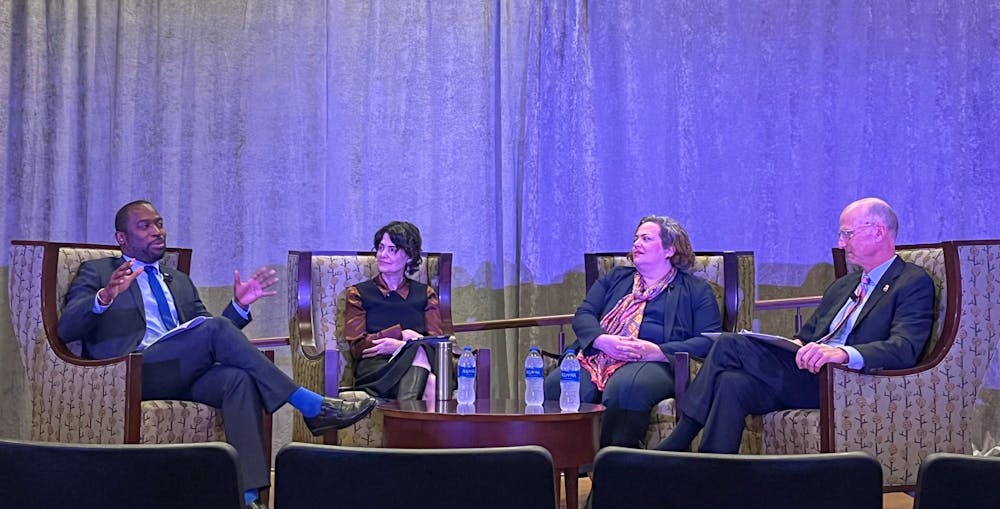Richmond Mayor Levar Stoney and international relations experts Nina Hachigian and Jenna Ben-Yehuda spoke on a campus panel about the importance of cities developing relationships across international borders to strengthen ties, foster foreign investment and share best practices.
The conversation about subnational diplomacy took place in the Ukrop Auditorium on Oct. 26 as a part of the Diplomacy Across America event moderated by Jeffrey Legro, executive vice president and provost.
Hachigian is the first person to serve in the newly created state department role of special representative for subnational diplomacy, and the panel was her first public appearance in the role. Her priorities include bringing the benefits of foreign policy such as foreign direct investment to the local level, creating internationally focused opportunities for young people and supporting cities and states in their diplomatic efforts, she said.
Strong ties between cities in the U.S. and abroad can help prevent conflict and increase U.S. soft power and positive cultural influence abroad, she said.
When nations fall short on issues like climate and democracy, there are often local leaders still interested in making progress, Hachigian said. After the U.S. announced its withdrawal from the Paris Climate Accords in 2017, many cities and states continued their participation in the agreement, becoming an example of the benefits of subnational diplomacy, she said.
During the discussion, Ben-Yehuda said it was important for cities to share best practices about how to deal with problems cities face such as pandemics, misinformation and cyber attacks. Her organization, the Truman Center for National Policy, just released a report on how important these city-to-city relationships are.
“So much of what makes America strong is not centered in Washington, it's not centered just in New York, it is all across this country,” Ben-Yehuda said. “Too often we don't bring all of that talent to the table.”
President Joe Biden’s administration has prioritized subnational diplomacy, describing it as “foreign policy for the middle class,” Hachigian said. There is bipartisan legislation in Congress to make her office permanent.
Stoney said he was enthusiastic about the possibility of international ties and foreign investment for the city, pointing out that Richmond has six sister cities over three continents.
“To see that we are having interactions with cities and with nations across the world shows that Richmond has matured,” Stoney said. “We are more cosmopolitan because of the diversity of our population, but also the fact that we have institutions who work in this arena on a regular basis.”
However, Richmond lacks the capacity to focus too heavily on foreign policy, with concerns over infrastructure and the economy taking priority, Stoney said.
When a community member asked Stoney what tangible benefits could come from an international focus, he touted the potential for opportunity.
Enjoy what you're reading?
Signup for our newsletter
“We have to be in the opportunity business,” Stoney said. “When I think about foreign relationships, I think about the potential for more opportunities.”
Stoney also pointed to the importance of these relationships during times of crisis. As Richmond deals with an increasing number of extreme weather events, the city should look to how other places have dealt with similar issues and apply their most successful practices.
Richmond also donated money to Ukraine, something that Hachigian said her office could help organize in the future.
Dale Christensen, a community member in attendance, said that it was important to balance diplomatic efforts with more basic needs that keep the city running.
“I can see people wanting basic things fixed,” he said. “On the other hand, subnational diplomacy is an investment in the future. It's a process of obtaining more economic growth so that they can fix the sidewalks and potholes.”
China also uses subnational diplomacy, so expanding programs within the U.S. will help the country compete with them, Hachigian said. Shanghai has more people focused on U.S. cities alone than the U.S. has focused on all international cities combined, she said.
Subnational diplomacy can also prevent future supply chain shortages, Ben-Yehuda said.
Non-governmental organizations like the University of Richmond could play a role in subnational diplomacy by engaging with sister institutions and pursuing international education, Stoney said.
Contact city and state writer Kalina Kulig at kalina.kulig@richmond.edu.
Support independent student media
You can make a tax-deductible donation by clicking the button below, which takes you to our secure PayPal account. The page is set up to receive contributions in whatever amount you designate. We look forward to using the money we raise to further our mission of providing honest and accurate information to students, faculty, staff, alumni and others in the general public.
Donate Now



